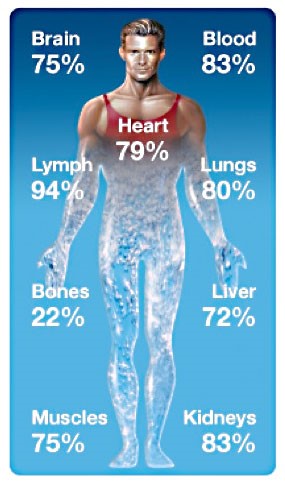 On average, the body of an adult human being contains 70% water. Most of the water in the human body is contained inside our cells. The average human body is comprised of 32 trillion cells that must have water to live and stay healthy.
On average, the body of an adult human being contains 70% water. Most of the water in the human body is contained inside our cells. The average human body is comprised of 32 trillion cells that must have water to live and stay healthy.
The total amount of water in our body is found in three main locations: within our cells – intracellular we find two-thirds of the water and within the space between our cells – and in our blood we find the remaining one-third of the water. For example, a 150 lb. man is made up of about 14.5 gallons of total water.
- 5 gallons is water within the cell (intracellular) water
- 5 gallons is water outside the cell (extracellular) fluid of which
- 93 ounces is blood plasma
- 31 ounces is the trans-cellular fluid (cerebrospinal fluid, ocular, pleural, peritoneal and synovial fluids)
- 5 gallons is interstitial fluid (including lymph), which is an aqueous medium surrounding the cells. (1)
The amount of water a body contains varies as we age with the body of a newborn composed of 75% water and the body of an elderly person being composed of 50% water. The more muscular a body is, the more water it contains, which is why people with muscular physiques weigh more that non-muscular persons of a similar size. Conversely, the more fat in the body, the less water the body contains – as body fat has little water.
Vital organs: the brain, lungs, heart, liver, and kidneys contain a large quantities of water between 65 to 85% depending on the organ (2), while bones contain less water around 20-31%.
Sources:
- (1) Wang et al. (1996). Am J Clin Nut 69 : 833-841
- (2) Mitchell et al. The Journal of Biological Chemistry, 1945: 625-637.
Water provides the body a means to balance the internal pH and remove the waste. An adequate daily supply ofAlkaline Antioxidant Water will improve the internal pH and waste removal process resulting in improved overall health. Failure to consume an adequate daily supply of water will result in increased acidity and lower internal pH, both of which will lead to inflammation and illness.


